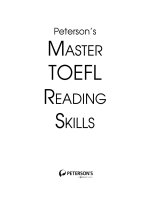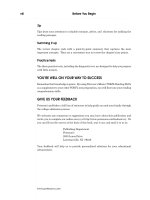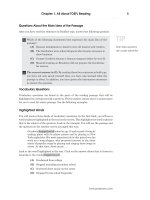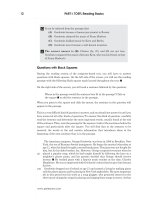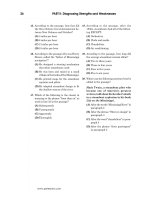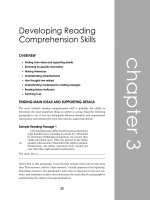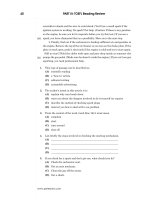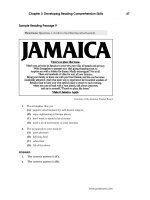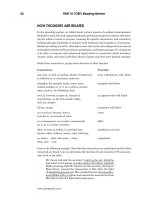Peterson’s master toefl reading skills part 2 pdf
Bạn đang xem bản rút gọn của tài liệu. Xem và tải ngay bản đầy đủ của tài liệu tại đây (76.38 KB, 7 trang )
viii Before You Begin
www.petersons.com
Tip
Tips draw your attention to valuable concepts, advice, and shortcuts for tackling the
reading passages.
Summing it up
The review chapter ends with a point-by-point summary that captures the most
important concepts. They are a convenient way to review the chapter's key points.
Practice tests
The three practice tests, including the diagnostic test, are designed to help you prepare
with little anxiety.
YOU’RE WELL ON YOUR WAY TO SUCCESS
Remember that knowledge is power. By using Peterson's Master TOEFL Reading Skills
as a supplement to your other TOEFL test preparation, you will fine tune your reading
comprehension skills.
GIVE US YOUR FEEDBACK
Peterson's publishes a full line of resources to help guide you and your family through
the college admission process.
We welcome any comments or suggestions you may have about this publication and
invite you to complete our online survey at Or
you can fill out the survey at the back of this book, tear it out, and mail it to us at:
Publishing Department
Peterson's
2000 Lenox Drive
Lawrenceville, NJ 08648
Your feedback will help us to provide personalized solutions for your educational
advancement.
00_TOEFL Reading FM,i-x 7/29/06, 11:478
Before You Begin ix
www.petersons.com
Top 10 Strategies
to Raise Your Score
1. As with other sections of the TOEFL, be familiar with the directions and
examples so you can begin work immediately.
2. For each passage, begin by briefly looking over the questions (but not the
answer choices). Try to keep these questions in mind during your reading.
3. Scan passages to find and highlight the important facts and information.
4. Read each passage at a comfortable speed.
5. Answer the questions, referring to the passage when necessary.
6. Eliminate answers that are clearly wrong or do not answer the question. If
more than one option remains, guess.
7. Mark difficult or time-consuming answers so that you can come back to them
later if you have time.
8. Timing is an important factor. Don’t spend more than 10 minutes on any one
passage and the questions about it.
9. Concentration is another important factor. The reading section is one of the
longer sections of the test. Your practice and hard work will help you.
10. Relax the night before the exam.
00_TOEFL Reading FM,i-x 7/29/06, 11:479
00_TOEFL Reading FM,i-x 7/29/06, 11:4710
P
ART I
TOEFL READING BASICS
CHAPTER 1 All About TOEFL Reading
01_TOEFL Reading Ch 1,1-14 7/29/06, 11:461
01_TOEFL Reading Ch 1,1-14 7/29/06, 11:462
chapter 1
3
All About TOEFL
Reading
OVERVIEW
• What does the reading section contain and how long does
it last?
• To read or not to read
• Summing it up
WHAT DOES THE READING SECTION CONTAIN AND
HOW LONG DOES IT LAST?
The Reading section contains passages on a variety of subjects. Following each
passage are several questions about the passage. You will answer from 36 to 70
questions in this section, and you will have 60 to 100 minutes to read the
passages and answer the questions. Before you begin this section, you will be
shown how to answer the questions with the computer screen and mouse.
The reading passages are similar to the ones you will probably read and study
in North American universities and colleges. There are three important differ-
ences between the Reading section and the other sections of the exam:
• The Reading section is not computer adaptive. When you answer question
number 1, the computer does not select a more difficult (or less difficult)
question for number 2.
• In the Reading section, you are allowed to return to questions you have
already answered and can change your answers. You are also permitted to
skip a question and return to it later, which you can’t do in the other sections
of the exam.
• You will see the Reading passage and the question on the monitor screen at
the same time. The Reading passage will appear on the left side of your
screen, and the questions will appear on the right side of the screen.
01_TOEFL Reading Ch 1,1-14 7/29/06, 11:473
4PART I: TOEFL Reading Basics
www.petersons.com
TO READ OR NOT TO READ
You will not be scored on whether you read the entire passage. You will be scored on
whether you answer the question correctly. It is not only probable that you can answer
all questions correctly without reading the entire passage; it is imperative that you read
only what is necessary to answer the questions.
So that you do not underestimate the importance of this advice, it will be repeated:
DO NOT READ THE ENTIRE PASSAGE BEFORE
YOU START ANSWERING THE QUESTIONS!
Most questions will indicate which part of the reading passage is being asked about.
Work through each passage answering the questions, using the process we describe in
the following pages.
Read the First Sentence of Each Paragraph and the Last Sentence in
the Passage
In the following passage, read only the sentences in boldface.
The American composer, George Gershwin, was born in 1898 in Brooklyn,
New York, the son of Russian-Jewish immigrants. He began his musical
education at age 11, when his family bought a second-hand piano. The piano was not
bought for him, but for his older brother, Ira. However, George surprised everyone
when he played a popular song, which he had taught himself by following the keys on
a neighbor’s player piano, and his parents decided that George should receive lessons.
He studied piano with a famous music teacher at the time, Charles Hambitzer. He was
so impressed with Gershwin’s talent that he gave him lessons for free.
Gershwin dropped out of school at age 15 and earned a living by making
piano rolls for player pianos and by playing in New York nightclubs. His
most important job in this period was his work as a song plugger, who promoted
interest in the sheet music of popular songs by playing and singing those songs in
stores. At that time, sheet-music sales were the measure of a song’s popularity, and
song pluggers had to work long hours for the music publishers who employed them.
As a result of his hard work, Gershwin’s piano technique improved greatly, so
much so that, while still in his teens, Gershwin became known as one of the most
talented pianists in New York City. As a result, he worked as an accompanist for
popular singers and as a rehearsal pianist for Broadway musicals.
His knowledge of jazz and popular music grew quickly, and one of his
songs was included in the Broadway musical The Passing Show of 1916.
George became friends to many prominent Broadway composers. He particularly
admired the music of Irving Berlin whom Gershwin called “America’s Franz
Schubert.” Jerome Kern, another Broadway composer, demonstrated to George
how popular music was inferior to material in Broadway shows. In 1919, enter-
tainer Al Jolson performed Gershwin’s song Swanee in the musical Sinbad. The
song became a hit, and Gershwin became an overnight celebrity when his
song sold more than 2 million recordings and a million copies of sheet
music.
(5)
(10)
(15)
(20)
(25)
01_TOEFL Reading Ch 1,1-14 7/29/06, 11:474
